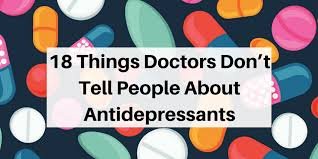Major Study Ignores the Real Truth About Taking Antidepressants

A recent questionable Oxford-led review published in The Lancet concluded that antidepressants work and that doctors should prescribe the drugs to millions more patients. Should this research put to rest the debate over the medications’ efficacy and safety? According to some experts, the answer is an emphatic no.
David Healy, Professor of Psychiatry at Bangor University, told the Daily Mail the authors exaggerated the drugs’ benefits and ignored the harms. He said the review monitored the responses of patients after eight weeks but failed to investigate the long-term side effects. Healy added that some of the clinical trials included in the review had been funded by pharmaceutical companies, which is a conflict of interest that could have influenced the findings.
Antidepressants aren’t harmless drugs. These medications come with a host of side effects including agitation, disabling anxiety, stroke, increased risk of bone fractures and an array of other ills. In rare cases, they can also cause homicidal and suicidal thoughts and behavior.

Do Antidepressants Correct Chemical Imbalances?
Most of the drugs included in the Oxford review work by raising level of serotonin, a neurotransmitter. For decades, low serotonin levels have been thought to be a cause of depression. This belief is a part of the chemical imbalance theory, which claims the disorder is due to too much or too little of certain brain chemicals.
The Washington Post reported that Lauren Slater, author of Blue Dreams, a book chronicling the history of psychiatric drug discovery, said the evidence supporting the role of neurotransmitters in depression is scarce. She noted that many people with low serotonin don’t have depression and pointed out that the medical community doesn’t actually know what a balanced brain chemistry looks like.
Healy shares Slater’s opinion that neurotransmitters don’t play a key role in depression. In an editorial published in the BMJ in 2015, Healy said the concept that depression is caused by an imbalance in serotonin, which is corrected by a class of antidepressants, is a myth originating from the marketing campaigns of pharmaceutical companies.

Antidepressants Increase Risk of Early Death
A 2017 review published in the journal Psychotherapy and Psychosomatics examined 16 studies comprised of 375,000 participants. In the general population, it found people taking antidepressants had a 33-percent higher risk of early death compared to those not taking the drugs. Moreover, antidepressant users were 14-percent more likely to have a heart attack or stroke.
The authors explained that the neurotransmitters, such as serotonin, that antidepressants disrupt have important functions all over the body — not just the brain. Consequently, the adverse effects of these serotonin-altering drugs can contribute to the risk of early death in various ways.
What Is the Solution for Depression?
Two natural agents help relieve depression, but instead of producing side effects, they have side benefits. A 2014 study published in the Journal of Affective Disorders found that a highly absorbable form of curcumin may relieve major depression and was found to be as effective as the antidepressant Prozac in doing so.
Other studies provide strong evidence that sticking to a regular exercise routine, following DASH diet and taking certain mood boosting supplements can help alleviate depression significantly.
Curcumin, exercise, eating a diet full of fruits and vegetables (like the DASH diet) and key supplements all offer multiple and wide-ranging health advantages aside from their mood-enhancing properties.
By Mary West
http://www.liveinthenow.com/article/major-study-ignores-real-truth-taking-antidepressants